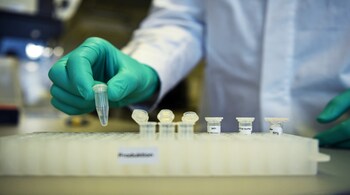New Delhi, Nov 25 Delhi Lt Governor Anil Baijal on Wednesday directed officers to ensure timely hospitalisation of COVID-19 patients under home isolation in case of emergency to reduce the mortality rate in the national capital which has recorded over 100 daily deaths in seven of the last 13 days. Sources said the lieutenant governor also asked officers to ensure strict monitoring of COVID-19 patients under home isolation, amid instances of some people not following isolation norms.
According to official data, there were 22,246 COVID-19 patients under home isolation in the national capital till Tuesday. Baijal on Wednesday reviewed the COVID-19 situation in Delhi, hospital preparedness and implementation of a new strategy and action points recently issued by Union Home Minister Amit Shah.
In a meeting of Delhi Disaster Management Authority, Baijal asked officials to enhance surveillance, strictly enforce containment measures, increase testing and scale-up requisite medical infrastructures like ICU and ventilators. "The LG has directed officers for strict monitoring of COVID-19 patients under home isolation and ensure their timely hospitalisation in case of emergency," a source said.
During the review meeting, Chief Minister Arvind Kejriwal requested experts to audit COVID-19 death cases and suggest measures to reduce fatalities in the national capital. The meeting was also attended by Deputy Chief Minister Manish Sisodia, Chief Secretary Vijay Dev, NITI Aayog Member V K Paul, AIIMS Director Randeep Guleria, ICMR DG Balram Bhargava as well as other experts and senior officers of the Delhi government.
On Tuesday, Delhi recorded over 100 COVID-19 deaths for the fifth consecutive day, and the death rate stood at 1.89 per cent. A total of 109 fatalities were recorded on Tuesday, as against 121 on Monday. This was the seventh time in the last 13 days that the daily number of deaths has crossed the 100 mark. A total of 109 fatalities were recorded on Tuesday, as against 121 on Monday.
Authorities reported 121 deaths on Sunday, 111 on Saturday, 118 on Friday,131 on November 18, the highest till date, and 104 fatalities on November 12. "The LG has also directed officers to strictly enforce necessary measures, especially wearing of face masks so that there is no laxity in the observance of COVID-appropriate behaviour. Authorities will take exemplary and deterrent action for violation of COVID-19 SOPs, especially in crowded markets," the official said.
The tally of active cases in Delhi on Tuesday stood at 38,501, as compared to 37,329 on Monday.
Discover the latest Business News, Sensex, and Nifty updates. Obtain Personal Finance insights, tax queries, and expert opinions on Moneycontrol or download the Moneycontrol App to stay updated!










